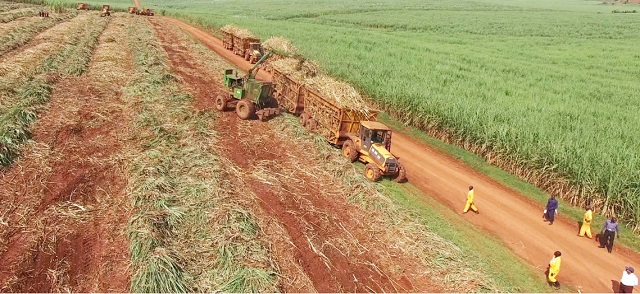
Cane shortage amidst increased exports complicates the equation for local consumption
Kampala, Ugnada | JULIUS BUSINGE | Local sugar consumers should brace themselves for further increases in price for the sweet commodity owing to a fall in production volumes amidst an increase in export volumes, according to industry players and experts.
The country’s sugar price has increased by up to 30% in the past month to an average of Shs5, 000 per kilogram, the highest over the last five years.
Jim Kabeho, the chairman of the Uganda Sugar Manufacturers Association (USMA), and Michael Mugabira, the coordinator of the Uganda Sugar Growers Association told The Independent in separate interviews that there are no short-term measures to bring down the sugar price and that it may remain high until the end of the year.
“We do not have enough cane and we are working at half the crushing capacity. Input costs like fuel and fertilizers have all gone up,” said Kabeho, who doubles as a director at the Muljibhai Madhvani and Company Limited, the parent company of Kakira Sugar Limited.
“Consequently, the price for a tonne of cane has increased from approximately Shs100, 000 in June to Shs170, 000 in September this year for most factories especially those located in Eastern Uganda – largely because of cane shortage.”
Data from the Ministry of Trade and Industry show that the country’s sugar production stood at 510,000 metric tonnes in 2020. However, consumption stood at 360,000 metric tonnes, creating a surplus of 150,000 metric tonnes.
Mugabira said some sugarcane out growers have abandoned the crop because it is not profitable – hence causing a shortage of the cane on the market – translating into high prices for the final product (sugar).
 The genesis of cane shortage
The genesis of cane shortage
Mugabira said the increase in sugar cane supply to factories since 2018 triggered a decline in prices, leading to a reduction in income for the farmers. And, while farmers found an alternative market in Kenya in 2020 to boost their income, the deal collapsed when the Kenyan government made a U-turn and banned sugar cane imports.
In the end, he said, most farmers cut down and others burnt their cane and opted for fast-growing and ‘profitable’ crops like rice and maize.
Mugabira said, for the last four years until early this year, cane farmers earned an average of Shs97, 000 per tonne yet one needs to pocket at least Shs140, 000 per tonne to break even.
“Sugarcane takes two years to mature and the more it matures, the more weight it loses – meaning less income for farmers,” he said, “so many had to abandon it for crops that mature in three months.”
Kenneth Barungi, a freelance consultant, who also worked in the sugar industry for 10 years, told The Independent that while he may not rule out cane shortage for the surge in sugar price, Kakira and Sugar Corporation of Uganda Ltd (SCOUL) since have invested in cane plantations.
He said unlike other factories located far apart, millers such as GM Sugar, Kaliro Sugar, Mayuge Sugar, and others, located mainly in Eastern Uganda were allowed to set up close to each other without investing in the sugar cane plantation.
He, however, said the current crisis could be attributed to mainly two factors: hoarding by wholesalers and exports of the commodity.
Indeed, the latest statistics from the Bank of Uganda show that the country’s sugar exports to neighboring countries have been increasing over the last four years.
For instance, Uganda’s sugar quarterly export volumes have more than doubled from 46,023 tonnes worth US$25million in the fourth quarter of 2018/19 to 80,776 worth US$57.6million in the fourth quarter of 2021/22.
On an annual basis, the country’s sugar export volumes have increased from 164, 273 tonnes with US$ 91million in 2018 to 204,929 tonnes worth US$ 100.3million last year.
Regrettably, Barungi said the government may not stop sugar hoarding because it operates a free economy and at the same time cannot also stop exports due to the need for foreign exchange.
Kabeho said there is a need for the government to reconsider the contentious sugar cane zoning aspect in the current Sugar Act 2020.
“The industry needs proper regulation,” Kabeho said, adding that there is a need for government to put in place a sugar board to organize farmers and millers to have proper contract arrangements to be able to stabilize the supply of cane and the price of sugar on the market.
MPs to investigate price surge
In response, Mwine Mpaka, the chairperson of the committee on Trade, Tourism and Industry and Member of Parliament for Mbarara City South told The Independent that his committee would in a week’s time investigate the skyrocketing price of sugar and issue a report.
However, he said, some millers were indeed lacking sugarcane to manufacture sugar and were thus harvesting young sugarcane which points to the fact that some millers are lacking enough cane.
Mpaka added that whereas the Sugar Act of 2020 excluded zoning for factories, in their interaction with government officials especially from the ministry of trade, they have been told that the sugar policy provides for zoning and that the government fully supports it.
On sugar exports, he said, the step would be a positive for the country because it will bring in the much-needed foreign exchange.
****
 The Independent Uganda: You get the Truth we Pay the Price
The Independent Uganda: You get the Truth we Pay the Price


